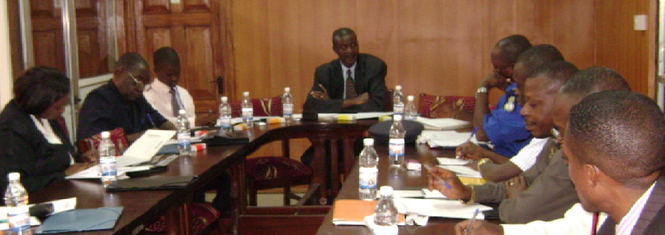
Sierra Leone
Seven years after the end of a catastrophic civil conflict, Sierra Leone is working to rebuild its critical state institutions and systems, including procedures for facing future disasters. After developing a national disaster policy and plan last year, the government is now turning to a new legislative framework for disaster response. In this context, it has invited the Sierra Leone Red Cross Society (SLRCS) and the Federation to provide it with support on IDRL, in the first such project to be undertaken in Africa.
In December, the Federation’s IDRL Delegate for Africa, Eilif Torma, visited Freetown for initial discussions about the project with key stakeholders. Mr. John Vandy Rogers, Acting Director of the Disaster Management Department of the Office of National Security, convened the heads of key governmental departments, SLRCS, as well as UN agencies and other major international relief agencies to talk about the importance of integrating legal preparedness for international disaster assistance into the new legislation.
“We have made important strides in ensuring that Sierra Leone is a disaster-resilient country,” Rogers noted, including through “the development of hazard profiles, disaster policies and contingency plans.” However, “the development of a disaster management law is now a priority for the National Disaster Programme.” SLRCS Secretary-General Emmanuel Hindovei Tommy likewise underlined the importance of a well-prepared legal framework and the willingness of the Red Cross to support the government, noting that “we are ready to take this project forward.”
A task force for the domestic implementation of the IDRL Guidelines in Sierra Leone has been formed and a prominent barrister, Ms. Cosmotina Jarrett, has been engaged to support the task force and perform the necessary legal research.
Uganda
In February 2009, Torma visited Kampala to explore the possibilities of developing a similar project in Uganda. He had the opportunity to meet with senior officials of the Uganda Red Cross Society, the Office of the Prime Minister, and other partners in the humanitarian and donor communities.
The concept for the project was warmly received, in particular in light of ongoing discussions in the country on the need to modernize its disaster management legislation as well as its laws governing non-governmental organizations. A follow-up visit is now being planned to create a task force and agree to project methodology.